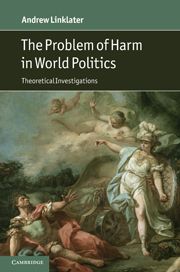Crossref Citations
This Book has been
cited by the following publications. This list is generated based on data provided by Crossref.
2011.
Publications Received.
Contemporary Sociology: A Journal of Reviews,
Vol. 40,
Issue. 4,
p.
517.
Linklater, Andrew
2011.
Process Sociology and International Relations.
The Sociological Review,
Vol. 59,
Issue. 1_suppl,
p.
48.
Rengger, Nicholas
2012.
Progress with Price?.
International Theory,
Vol. 4,
Issue. 3,
p.
468.
Hallemeier, Katherine
2013.
J.M. Coetzee and the Limits of Cosmopolitanism.
p.
69.
Barnett, Michael N.
2013.
Humanitarian Governance.
Annual Review of Political Science,
Vol. 16,
Issue. 1,
p.
379.
Brown, Chris
2013.
The poverty of Grand Theory.
European Journal of International Relations,
Vol. 19,
Issue. 3,
p.
483.
Gallagher, Adrian
2013.
Genocide and its Threat to Contemporary International Order.
p.
145.
Fry, Douglas P.
and
Souillac, Geneviève
2013.
The relevance of nomadic forager studies to moral foundations theory: moral education and global ethics in the twenty-first century.
Journal of Moral Education,
Vol. 42,
Issue. 3,
p.
346.
Burke, Anthony
2013.
The good state, from a cosmic point of view.
International Politics,
Vol. 50,
Issue. 1,
p.
57.
Koschut, Simon
2013.
Sicherheitspolitische Identität in den Internationalen Beziehungen: konzeptionelle Überlegungen und empirische Praxis.
Zeitschrift für Außen- und Sicherheitspolitik,
Vol. 6,
Issue. 1,
p.
53.
Prichard, Alex
2013.
Justice and EU Foreign Policy.
Journal of Contemporary European Studies,
Vol. 21,
Issue. 3,
p.
413.
Stullerova, Kamila
2013.
Rethinking human rights.
International Politics,
Vol. 50,
Issue. 5,
p.
686.
Gallagher, Adrian
2013.
Genocide and its Threat to Contemporary International Order.
p.
40.
Brincat, Shannon
2013.
The Harm Principle and Recognition Theory.
Critical Horizons,
Vol. 14,
Issue. 2,
p.
225.
Ackerly, Brooke
2013.
Justice, Sustainability, and Security.
p.
27.
Ward, Eilís
2013.
Human Suffering and the Quest for Cosmopolitan Solidarity: A Buddhist Perspective.
Journal of International Political Theory,
Vol. 9,
Issue. 2,
p.
136.
Cochran, Molly
2013.
Guide to the English School in International Studies.
p.
185.
Lindemann
2014.
Interest, passion, (non)recognition, and wars: a conceptual essay.
Global Discourse,
Vol. 4,
Issue. 4,
p.
483.
Booth, Ken
2014.
The Handbook of Global Security Policy.
p.
9.
KOSCHUT, SIMON
2014.
Emotional (security) communities: the significance of emotion norms in inter-allied conflict management.
Review of International Studies,
Vol. 40,
Issue. 3,
p.
533.





